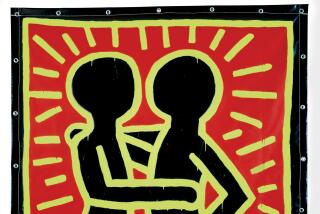A Ferocious Spirit, Untamed
- Share via
Keith Jarrett’s piano playing is based upon one fundamental tenet: no fear.
Engaging the keyboard with passionate intensity, his slight frame often writhing in dance-like gyrations, his head thrown back, his throat occasionally uttering growls and grunts, he is the visualization of a man possessed, literally giving himself over to the channeling of music through his body and into the instrument.
His performances--especially his now legendary solo outings--are sheer feats of musical chance-taking. Improvisational versions of free rock climbing; tightrope walking without a net.
“It’s dangerous,” says Jarrett, 53. “And I think that’s partly why I’m drawn to it--because of the danger. Look, you’re sitting comfortably in a room, and you’re conditioned to think that it’s safe. But something could happen. The roof could fall in.
“So the drive to do music that way came from the realization that being safe is a lie, anyway, that if I’m not going to be safe, I might as well be aware of that and be present for whatever comes through me at the time.”
What Jarrett didn’t realize, over the many years--dating back to the early ‘70s--in which he performed as many as 50 grueling solo concerts a year, was that he was risking, perhaps generating, an entirely different kind of danger.
It finally caught up with him in November 1996.
“The only way I could describe it,” he says, “was that aliens were invading my body. That was actually how it felt.”
Jarrett was in Italy for a solo performance. He had not been in especially good physical shape for a few months before the tour, but nothing prepared him for what was to happen.
“It just hit me like lightning,” he says.
“It,” Jarrett now knows, was the onset of chronic fatigue syndrome. At the time, it was nameless and undefined, as mysterious to the pianist as it was frightening. And above all, it was painfully debilitating.
“I managed to do those concerts,” he says, “but the only way I did them was by staying in bed most of the day, and getting up to go to the concert.
“But this was in the middle of a tour. So, somehow, I willed myself . . . and finished my job as a professional. But I could tell while I was playing that I almost had to just throw my arms around, and if something happened, I’d be lucky.”
Lucky enough to garner rave reviews from the Italian critics. But it signaled the end of Jarrett’s playing for nearly two years.
On Thursday at UCLA’s Royce Hall, he makes his first Los Angeles appearance since 1995 in a concert with his “Standards” trio--including bassist Gary Peacock and drummer Jack DeJohnette. Including a concert last October in Newark, near his New Jersey home, it is only Jarrett’s second performance since the fateful Italian tour.
The concert takes place the night after the Grammy Awards, when Jarrett will discover whether or not his sixth nomination--for “Tokyo ‘96”--will produce his first award. (His five previous nods include two trio albums, two classical sessions and one solo album.)
A Bittersweet Time
The nomination--with Peacock and DeJohnette in the jazz instrumental performance, individual or group category--is somewhat bittersweet, given that it’s for a live performance that took place shortly before Jarrett became ill.
He has spent the intervening time in seclusion, initially trying to find the correct diagnosis for his malady, then undergoing a rigorous drug and diet therapy. Still balancing good days against bad--an October concert in Chicago had to be canceled--Jarrett has essentially been homebound.
“I haven’t even been out to dinner since November of ‘96,” he said recently by phone. “And I wouldn’t have been able to do this interview a month ago.”
Jarrett’s uncertain pattern of recovery and relapse is not uncommon to victims of chronic fatigue syndrome, an elusive, misunderstood disorder, its seriousness undercut by the apparent triviality of its label.
“The stupid thing is that the name of the disease is so lightweight,” Jarrett says. “It sounds like somebody whining to their mother, ‘I don’t want to take the garbage out.’ Well, OK, you’ve got chronic fatigue syndrome.
“But some doctors say that if you want to give the average person an idea . . . it’s like the last four months of an AIDS patient’s life--but forever. I know people who have had this who have wished that they had terminal cancer.”
The Centers for Disease Control and Prevention in Atlanta describe chronic fatigue and immune dysfunction syndrome as “a serious, multi-systemic disease, organic in origin. . . . While there are many suspected causes of the disease, there is currently no definitive evidence of one causative agent.”
CDC studies in Seattle and San Francisco estimate that the disease has a prevalence anywhere between 75 to 265 people per 100,000 population. The CDC also estimates that “perhaps as many as half a million persons in the United States have a CFS-like condition.”
When the symptoms struck Jarrett, however, he had no idea where to turn.
“In the beginning, I just read and read, trying to figure out what the hell it could be,” he says. “I tried to go with what I felt, and looked through descriptions of illnesses or syndromes. . . . I knew there was something called chronic fatigue syndrome, but I had no idea what it was.”
Although CFS remains a still somewhat mysterious disease, there are several possible causes, which may function individually or as multiple precipitating factors. Among them are infectious agents, immunological dysfunction, physical or emotional stress and nutritional deficiency.
Jarrett believes that his syndrome was caused by a combination of airborne pathogens and stress factors.
If he is correct about his contracting of the disease, then Jarrett is probably also correct in his belief that the stresses associated with his performing schedule of the last few decades created an increased susceptibility.
His solo concerts obviously placed especially strong demands upon him. But those performances were enormously successful, with albums such as his 1975 “The Koln Concert” selling millions of copies.
“I think there is an essential insanity--physical and emotional insanity--to the solo thing,” Jarrett says. “In the way I approach my work, I was asking for it. If there was anything that was going to be triggered, it would be triggered. And in my case, certain things came together at a certain moment, and everything broke down. The few people who know how much I put into each performance were probably amazed for 20 or 30 years that I was still alive.
“When I was in that format, I felt like I was in a universe that I had absolutely no control over, versus a universe where I could always touch base. In print I would say ‘dangerous,’ and people would think, ‘That’s a little over the top,’ or ‘That’s really self-absorbed,’ or something. But it was the truth. And now I’m sort of proving to myself that I was right. But after what’s happened to me, I wish I had been wrong.”
Pushing Ahead
When he breaks his current seclusion to play at Royce, Jarrett will be moving into unknown territory, insofar as his disease is concerned.
“I have no idea how it’s going to work,” he says. “But I’m just going to have to handle it.”
His prognosis is still somewhat uncertain. The CDC studies indicate that only 45% of CFS patients will regain 80% of their former abilities within five years of onset. Jarrett, however, is seeing slow, steady improvement, still interrupted by occasional relapses. But he is approaching his recovery with the same determination he has always brought to his music.
“Taking antibiotics for two years can be pretty daunting,” he says, “and a lot of people don’t want to go through that kind of a course of treatment. But the bottom line is that I want to get well, and I don’t care if I have to go through hell to get there.”
*
* Keith Jarrett, Gary Peacock and Jack DeJohnette perform Thursday at 8 p.m. at UCLA’s Royce Hall. Tickets are $25, $34 and $40. (310) 825-2101 or (323) 480-3232.
More to Read
The biggest entertainment stories
Get our big stories about Hollywood, film, television, music, arts, culture and more right in your inbox as soon as they publish.
You may occasionally receive promotional content from the Los Angeles Times.










